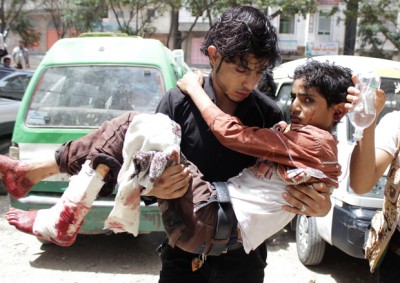Suffer Little Children, We Command You
Because of adults, there are so many places on this earth for children to be sad

Note to readers: please click the share buttons above
When the voices of children are heard on the green,
And laughing is heard on the hill,
My heart is at rest within my breast
And everything else is still.
— William Blake, Nurse’s Song
It is a sad time to be a child. Who’d have thought it just a few years ago. Consider Syria, Yemen, South Sudan, and the United States, to name just a few of the places where sadness for children prevails.
The war began in Syria five years ago. More than 6.1 million Syrians have fled their homes. Imagine what it is like to be a child, homeless in the country you call home, hearing the bombs destroying the neighborhoods in which you formerly played, destroying the house you just fled, the house in which you left behind your beloved toys and stuffed animals. You are one of the 2.5 million children who have been displaced since the beginning of the Syrian war. You are sad because you knew someone who was among the 500,000 Syrians who have been killed since the war began. Fourteen percent of the people killed in the last five years of war have been children like you. Perhaps you can find solace in the fact that you are part of the largest displaced population in the entire world. Children are apt to think that being part of something big is something to be proud of. It’s not. And if you are looking for sadness you can go to Yemen.
In Yemen you are living in a country that has the largest food security emergency in the entire world. According to United Nations officials, in 2017 there were 18 million people in Yemen in need of assistance out of a population of 28 million. That number includes hundreds of thousands of children. It is a sad time to be a child when you reflect on what happened on August 9, 2018. That was the day that a school bus carrying students on a school outing was destroyed by a bomb manufactured in the United States by Lockheed Martin, sold to Saudi Arabia by the United States government, and delivered to the school bus on a Saudi led coalition warplane. The coalition includes the United States. Forty boys ranging in age from six to 11 were killed. Eleven adults were killed. Seventy-nine people were wounded, 56 of them children. It was a very sad day to be a child in Yemen.
It is a sad time to be a child if you were born in South Sudan. According to the United Nations refugee agency, 17,600 South Sudanese children have fled that country since the outbreak of Sudan’s civil war in 2013, leaving their parents behind. For a few of the children, their sadness has been ameliorated. According to the United Nations agency, 433 unaccompanied minors who fled to Uganda without their parents have been reunited with them. That leaves the United Nations refugee agency with only 99,342 open cases of attempts to reunite families, families comprising in part sad children.
It is a sad time to be a child if you are a child in the United States whose parents hoped to find asylum in the United States of America, to get away from dangerous conditions in the country from which they’d fled. Just like the 17,600 children who left South Sudan without their parents, you were separated from your parents when you entered the United States. It is sad to be a child who upon arriving in the United States is not separated from parents but is held in squalid conditions that would not be tolerated if you were anyone other than the child of someone seeking asylum. It was sad that when your mother told one of the immigration officials that your one-year old sibling needed solid food, she was told that she was not living in a seven-star hotel and was asked whether she would rather have a skinny child or a dead child. It is sad to be a child when, according to a United States Senator who visited an immigration center where people seeking asylum are being held, reports that: “There are children by themselves. . . . little girls who are 12 years old are taken away from the rest of their families and held separately. Or little boys. They’re all lying on concrete floors in cages. There’s just no other way to describe it.” It is sad to be a child in a country where, in response to a court order that families whom the government had separated be reunited, and at the end of July, 700 families had still not been reunited and the government has had difficulty accounting for their whereabouts.
It is sad to be a child in Syria. It is sad to be a child in Yemen. It is sad to be a child in South Sudan. It can be sad to be a child in the United States. It is sad that because of adults, there are so many places for children to be sad.
*
Christopher Brauchli is a columnist and lawyer known nationally for his work. He is a graduate of Harvard University and the University of Colorado School of Law where he served on the Board of Editors of the Rocky Mountain Law Review. He can be emailed at [email protected]. For political commentary see his web page at http://humanraceandothersports.com
This work is licensed under a Creative Commons Attribution-Share Alike 3.0 License

